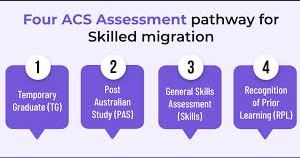Your cart is currently empty!

Skills Assessment for Australian Skilled Migration
When applying for skilled migration to Australia, a skills assessment is a critical step. This process evaluates whether your qualifications and work experience meet the standards required for your nominated occupation under Australia’s skilled migration program. Conducted by designated assessing authorities, a successful skills assessment confirms that you have the necessary skills to contribute to the Australian economy in a skilled capacity.
What is a Skills Assessment?
A skills assessment is a formal evaluation of your educational qualifications, work experience, and other credentials to determine if they align with the requirements of the occupation you intend to nominate in your visa application. Each occupation has a specific assessing authority responsible for verifying the suitability of applicants for that field. For example, Engineers Australia assesses engineering occupations, while the Australian Nursing and Midwifery Accreditation Council (ANMAC) handles nursing professions.
Why is Skills Assessment Important?
- Visa Eligibility: A positive skills assessment is essential for eligibility under various skilled migration visa categories, such as the Skilled Independent Visa (subclass 189), Skilled Nominated Visa (subclass 190), and the Skilled Work Regional Visa (subclass 491).
- Points Calculation: In the points-based system for skilled migration, the skills assessment verifies your qualifications and work experience, which are crucial for scoring points toward your visa application.
- Employment Readiness: The skills assessment assures the Australian government that you possess the competencies needed to integrate into the Australian workforce, adding credibility to your application.
Steps in the Skills Assessment Process
- Identify the Relevant Assessing Authority: Each occupation listed under the Australian and New Zealand Standard Classification of Occupations (ANZSCO) has a designated assessing authority. Check the Department of Home Affairs’ website to find the right body for your occupation.
- Review Assessment Requirements: Each assessing authority has unique criteria, including documentation requirements, minimum qualifications, relevant experience, and, in some cases, specific licensing or certifications. Be sure to follow these closely.
- Submit Your Application: Compile and submit your application, which typically includes:
- Academic transcripts and certificates
- Detailed CV/resume
- References from previous employers
- Proof of English language proficiency (if required)
- Identification documents
- Wait for the Outcome: Once submitted, the assessment process can take several weeks or months, depending on the authority and the complexity of your case. Upon completion, you’ll receive an outcome letter indicating if your skills meet the standards for your nominated occupation.
- Use the Outcome for Your Visa Application: A positive skills assessment outcome is essential for lodging an Expression of Interest (EOI) in the SkillSelect system and applying for your chosen visa.
Common Skills Assessing Authorities
- VETASSESS: Assesses a broad range of professional, managerial, and technical occupations.
- ACS (Australian Computer Society): Handles IT and computing professions.
- Engineers Australia: Assesses qualifications for engineers across various fields.
- ANMAC: Manages assessments for nurses and midwives.
- TRA (Trades Recognition Australia): Covers trade occupations.
Preparing for a Successful Skills Assessment
- Understand Documentation Requirements: Make sure to read the guidelines provided by the assessing authority and gather all required documents. Incomplete submissions can delay or negatively affect your outcome.
- Demonstrate Relevant Work Experience: Work experience requirements vary by occupation, so ensure your references clearly outline your duties and responsibilities to match the standards expected in Australia.
- Consider an English Language Test: Some assessing authorities require proof of English proficiency as part of the assessment. Check if this is needed for your occupation and prepare accordingly.
- Keep Copies of All Documentation: Retain digital and hard copies of your documents, as you may need them for your visa application or any appeals.
How MRG Global Can Assist You
Navigating the skills assessment process can be challenging, particularly with unique requirements for each occupation. At MRG Global, we provide tailored assistance, from document preparation and submission to ensuring you meet the standards set by your assessing authority. Our team’s expertise in Australian migration and assessment requirements can significantly improve your chances of a positive outcome.
Contact MRG Global Today
For more personalized support with your skills assessment and skilled migration process, reach out to MRG Global:
- Email: admin@mrgglobal.org
- Website: mrgglobal.com.au
- Phone: +61 434 119 565, +61 461 258 229








Leave a Reply